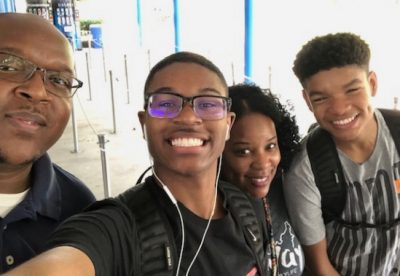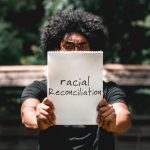 A few years ago, our family of four took a trip to Memphis to visit the National Civil Rights Museum. And of course, to enjoy some good Memphis barbecue! It was something we have done on a fairly regular basis since our boys were younger.
A few years ago, our family of four took a trip to Memphis to visit the National Civil Rights Museum. And of course, to enjoy some good Memphis barbecue! It was something we have done on a fairly regular basis since our boys were younger.
But this time was different.
Unlike previous trips, where the adults engaged in conversation in the front seat of the car and the boys engaged in childlike banter in the back seat, there was a complete change in dynamics. This time, because the experience was so impactful on all of us, we engaged in thought-provoking conversation as a family, and together, reflected on the exhibits we had seen that day.
“What must it have been like during the era known as the Civil Rights Movement?” we pondered.
Suddenly, the usual two-hour trip home felt like 30 minutes.
From that day forward, reflecting on the life and legacy of Dr. King would no longer be a once a year thing for our family. We knew if we were not careful, the attributed quotes and attention given to Dr. King and Black history in general this time of year—while well-deserved and very much appreciated—could become trite, routine, and without much heart.
A legacy for all people
Every year, we see the world around us doing “a good thing” with their celebrations and acts of service on Martin Luther King Jr. Day. But we sometimes wonder if the revelation of what Dr. King stood for, and the fact that his dream in many ways is yet to be realized, hasn’t quite reached our hearts.
As a couple, we have lived with the awareness of the difficulties Black people faced during the time Dr. King led so many in the fight for equality. We have heard stories from our parents, grandparents, and many others about the challenges they witnessed and faced. Visiting the museum that day allowed for a sobering visual of the reality of those challenges and the sacrifices many Black people made. They made those sacrifices so that we (their children and grandchildren, as well as the children and grandchildren of our neighbors and friends) could live in a world that offers both equity and equality.
The truth is, Dr. King left a legacy from which anyone of any race can benefit.
Even though many people believe Dr. King’s fight was only about Black people, when you take the whole of his discourse, you find it was about all of humanity. While being Black, in an eerily similar time of social unrest like today, was most certainly the catalyst and driving motivation for the movement, he knew, as a man of God, that the struggle was deeper. He knew his dream needed to be understood and embraced by all in order for a real difference to be made in this world.
He was a man who fought for the rights of people, like his four little children, to be seen, respected, and treated as the sons and daughters of God they are.
Dr. King knew the eyes of the world we live in look nothing like the eyes of God. He wanted us to begin to look at each other through the eyes of God. “For the LORD sees not as man sees: man looks on the outward appearance, but the LORD looks on the heart” (1 Samuel 16:7).
Seeing people the way God sees them is one very important way our family strives to live out Dr. King’s legacy. It makes it much easier to show kindness and have empathy for others. We know all too well when we look at others through our own lens, the view becomes warped, distorted, disproportionate, and unforgiving.
So many are on the receiving end of an unfair glance. Dr. King’s legacy teaches us it doesn’t have to be this way.
Making a Difference
Too many people, including Dr. King, suffered and died for us to not take advantage of the opportunities we’ve been given to be different and to make a difference. As parents, regardless of color, we all have our fair share of challenges navigating the seasons of life as we seek to raise children who will be safe, valued, and judged by their character. This is a reality for all parents. However, when it comes to raising young Black men in America, there is a heightened awareness of the world around us and its perceptions. We have had to be intentional in many ways, because we do not want our sons to become a statistic.
In order to make the best difference in our children’s lives, we have chosen to not raise them in our own strength but by placing our faith and trust in God to help us raise them to be who He has called them to be.
Therefore, we have placed the most emphasis on teaching them to know God personally—“to walk in a manner worthy of the Lord, fully pleasing to him: bearing fruit in every good work and increasing in the knowledge of God” (Colossians 1:10). And we wanted them to understand their identity in Christ. It is very easy to prioritize other things for our children and as parents, we do so many times without truly understanding the ramifications of having those competing priorities.
Seeking God in prayer and using His word as daily guidance have been the ultimate keys for us. Does this mean when we seek God in prayer and use His word as guidance that we will produce perfect children? Certainly not. However, the combination of the two has helped tremendously. We’ve made decisions as parents that were not always popular with our children, but being faith-led has helped and continues to help develop them into the kind of people God is calling all of us to be.
Changing the World
In our family and as believers, we measure all things by the word of God. Otherwise, we are tossed to and fro with the world’s changing viewpoints, never able to steady ourselves on a firm foundation (see Matthew 7:24-27).
You don’t have to agree with someone on every topic. In fact, as a believer, you most certainly shouldn’t be agreeing with everyone about everything (although the culture today aggressively suggests we should). Our ethnicities, backgrounds, life experiences, and especially our faith (or lack thereof) shape most of what we do or do not believe, so naturally, there are always going to be different perspectives.
However, as Dr. King exhibited, we should still be respectful toward others while remaining unwavering and uncompromising in our faith. Kindness, humility, and loyalty to God are attributes that should be a part of every Christian’s character (see Colossians 3:12-15).
Character.
That by which Dr. King wanted all of us to be ultimately judged.
Not the color of our skin.
Character.
That which is on the inside of us.
As we celebrate MLK Day as a family, we’ll take time to talk about the sacrifice Dr. King and so many others made on behalf of our family . . . and yours.
We will also talk about how important it is to serve and help others because that was Christ’s example first.
As parents, it makes us proud when our children are willing to help others without hesitation. We have tried to set a good example. And though none of us will always get it right, our children have been taught they represent not only their immediate family, but also their ancestors and the very dream of which Dr. King spoke.
But more importantly, they represent our Lord and Savior, Jesus Christ. Ultimately our life and legacy is measured by Him.
We are praying the legacy of faith will continue on through our children and our children’s children. As John the Evangelist wrote in 3 John: 1:4, “I have no greater joy than to hear that my children are walking in the truth.”
We pray that all people will allow Dr. King’s legacy to become a revelation that reaches deep within our hearts and changes this world for better. For good . . . for God.
Copyright © 2021 by FamilyLife. All rights reserved.
Rodney and Lisa Adams have been married for 22 years and counting. They have two sons, Zion and Noah, and reside just outside of Little Rock, Arkansas. They enjoy spending time together as a family, especially road trips and museums. Rodney is an accounting manager for FamilyLife.


